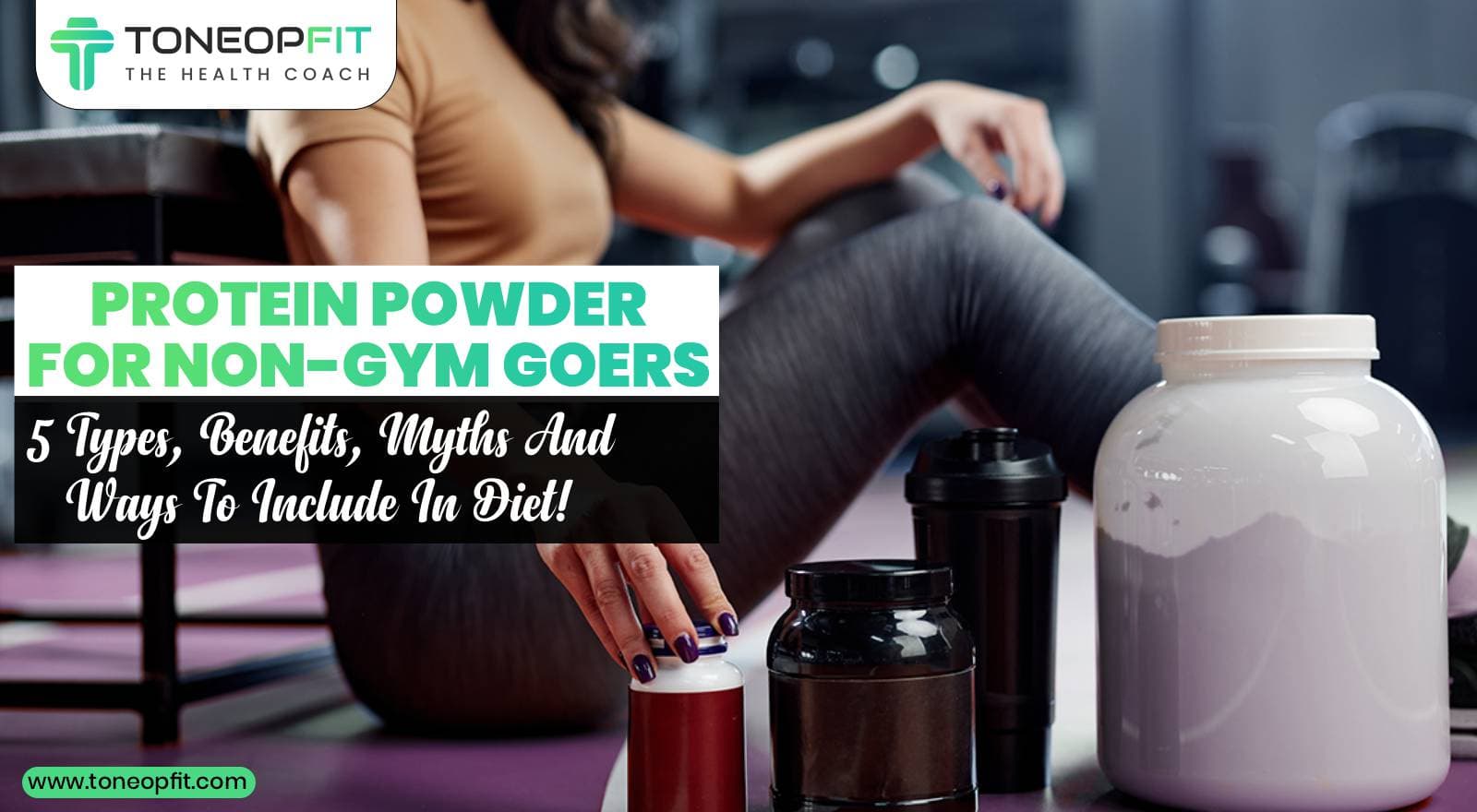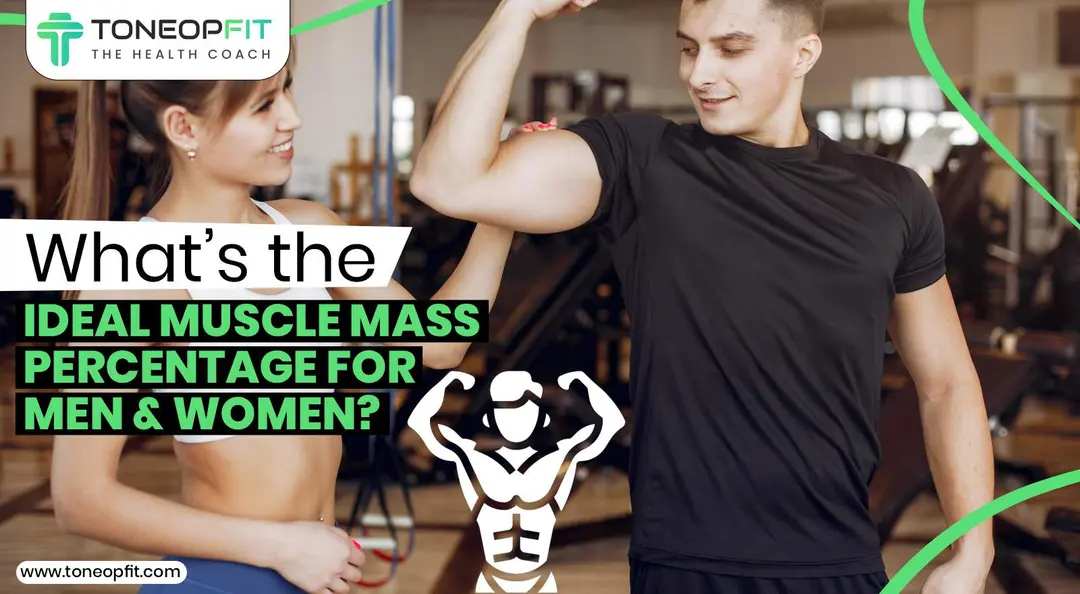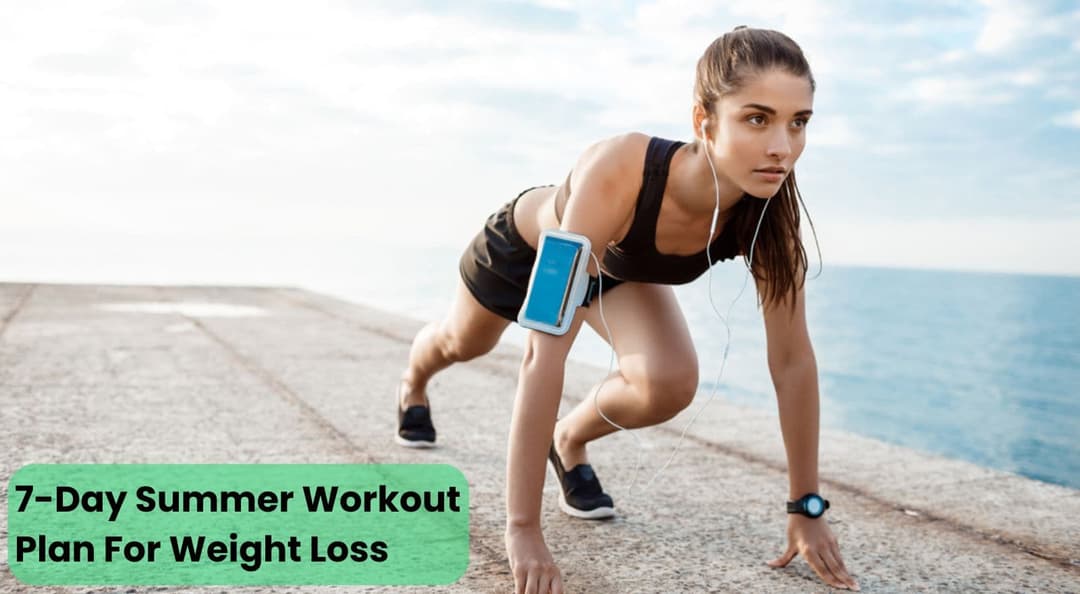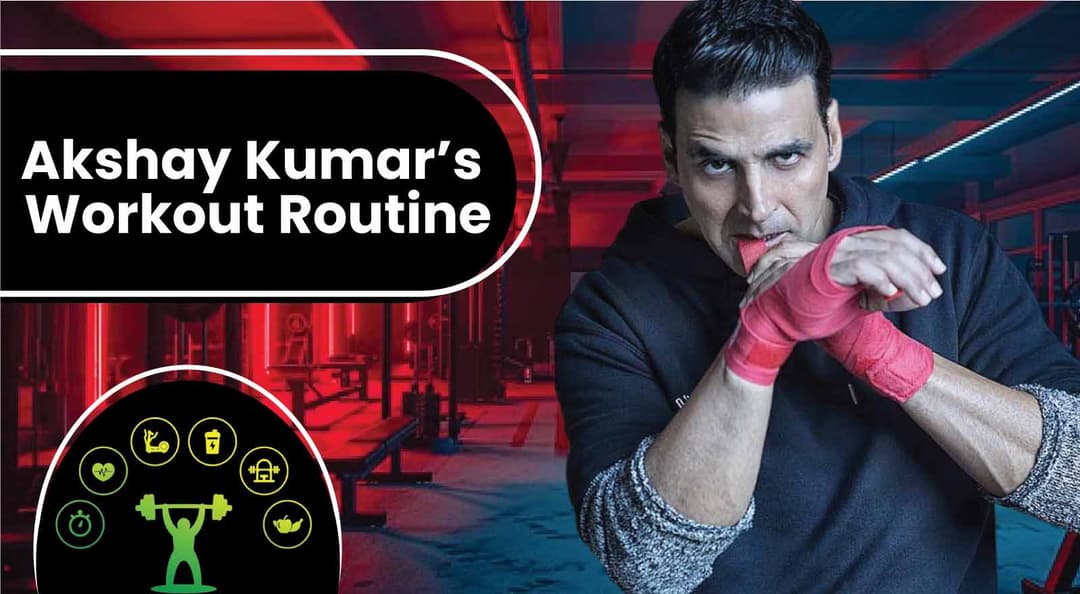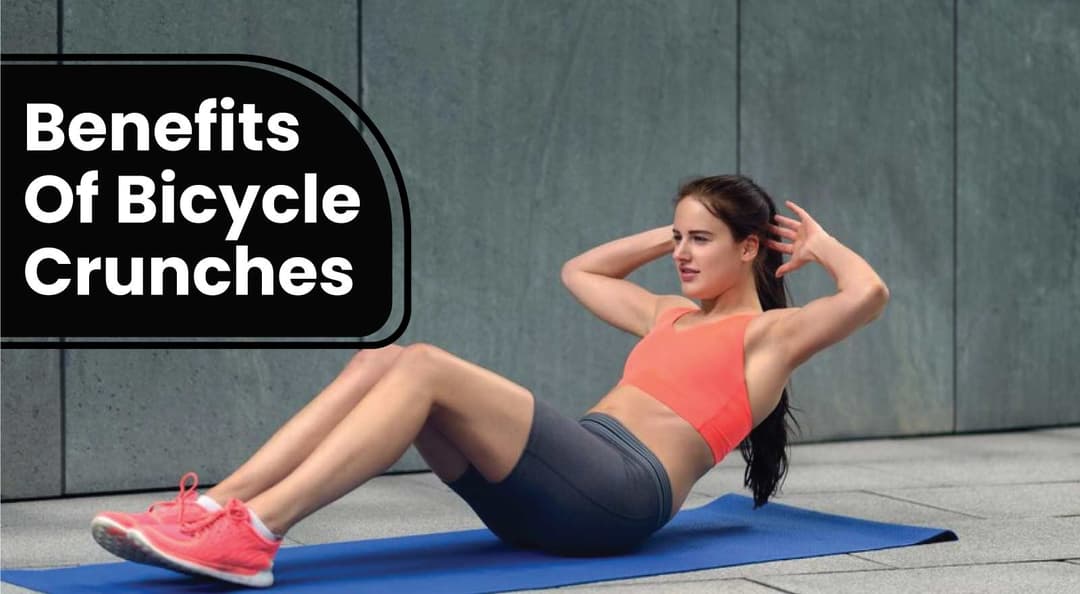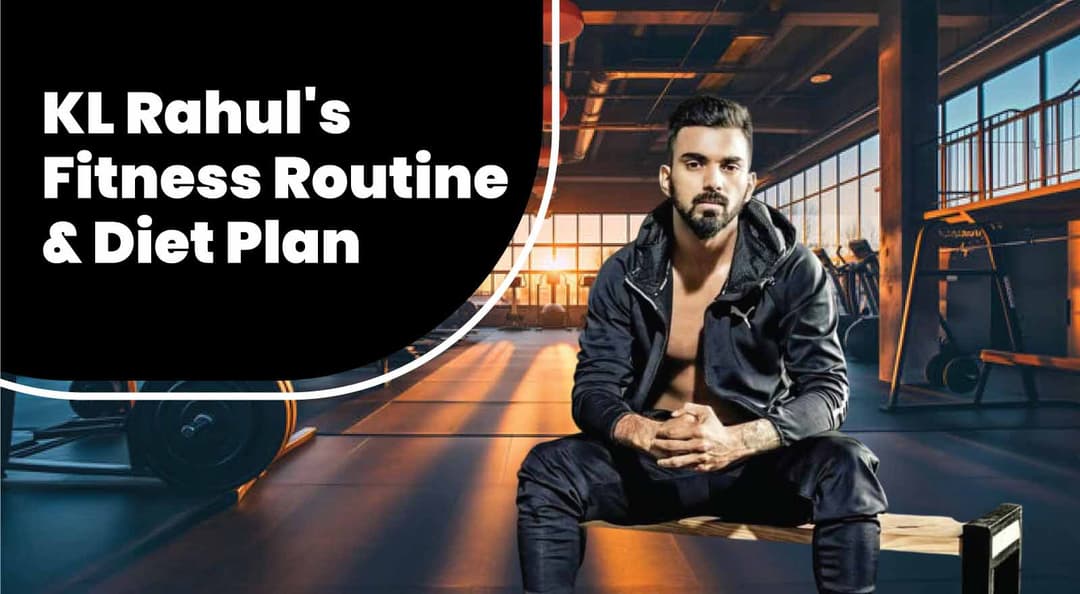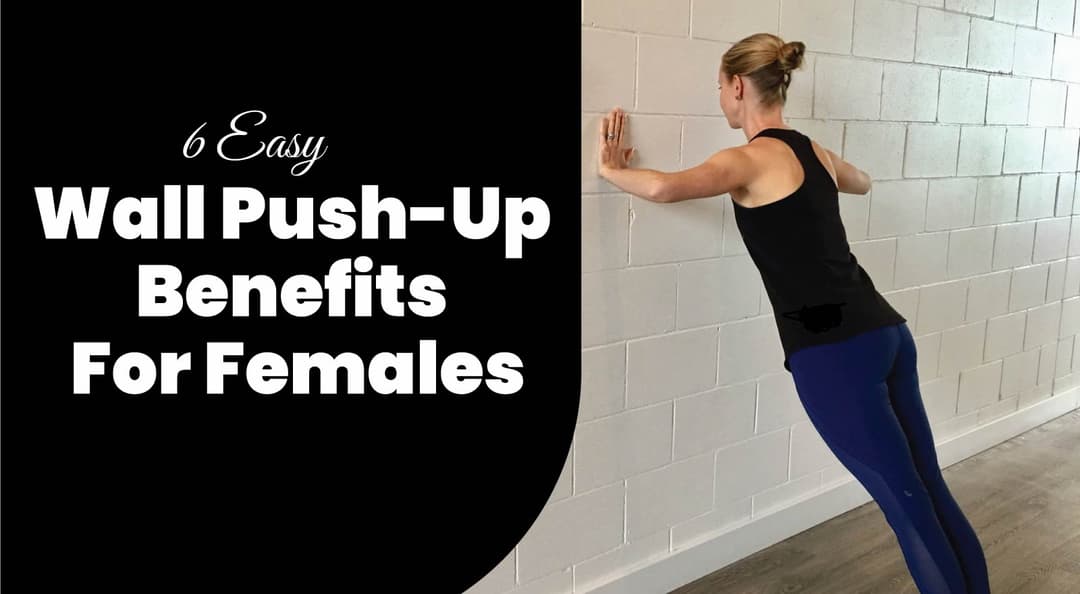Are you a non-gym goer struggling to meet your daily protein requirements? Do you worry about muscle loss or weakened bones? Protein powder for non-gym goers has become a popular supplement for those who wish to maintain adequate protein intake. It offers a convenient and efficient way to increase protein intake required for muscle repair, tissue growth, and hormone production. While protein powder is often recommended for bodybuilding and weightlifting, it is also included in the personalised diets of people who don't exercise regularly to support holistic wellness.
This blog explores the various types of protein powder and their benefits to support your body's functions and fitness goals. It rectifies common misconceptions and gives practical ways to include protein for non-gym goers. So, keep reading!
Table Of Contents
1. Can I Take Protein Powder Without The Gym?
2. 5 Types Of Protein Powder For Non-Gym Goers
3. Is Protein Powder Good For People Who Don’t Work Out? 5 Benefits
4. 4 Myths About Protein Powder For Non-Gym Goers
5. 9 Ways To Include Protein For Non-Gym Goers
6. Protein Requirement According To Age Groups
7. Dietitian’s Recommendation
8. The Final Say
9. FAQs
10. References
Can I Take Protein Powder Without The Gym?
Absolutely, you can take protein powder even if you don't go to the gym. Protein powder is a convenient supplement for protein intake, especially in foods for post-workout recovery and if you go back and forth for your daily nutritive requirements through whole foods alone. It can be beneficial for various reasons, like supporting muscle health, aiding in weight management, and promoting wellness.
However, it's important to include a high-quality protein powder, consult a registered dietitian for personalised advice, and ensure you are consuming it in moderation as part of a personalised diet.
Also Read: 7 Top Foods For Muscle Recovery And Growth | ToneOp Fit
5 Types Of Protein Powder For Non-Gym Goers

Note these types of protein powders for non-gym goers for alternating your preferences:
1. Whey Protein
Sourced from cow's milk, whey protein is a rapidly absorbed, complete protein that athletes in gluten-free diet foods often favour. However, its quick absorption and complete amino acid profile make it a valuable option for anyone seeking a quick protein boost.
2. Casein Protein
Another milk-derived protein, casein, offers a slower release of amino acids, making it ideal for pre-bed consumption to support overnight muscle repair. While often associated with athletes, its sustained-release properties can benefit anyone looking for a steady protein supply throughout the day.
3. Plant-Based Protein
For those following vegetarian or vegan diets or dealing with lactose intolerance, plant-based proteins in energy-boosting foods like peas, hemp, rice, or soy offer a viable alternative. While they may not individually contain all essential amino acids, combining them with other plant-based proteins can create a complete protein profile.
For a natural and plant-based way to boost your strength and muscle-building goals, try ToneOp Care's Alfalfa Powder, which is the perfect solution. This superfood is packed with essential nutrients and vitamins, making it the best plant-based protein powder. Whether you are a vegan or simply looking for a healthier way to fuel your body, Alfalfa Powder can help you achieve your fitness objectives.
4. Egg Protein
Derived from eggs, this protein powder is a great choice for those sensitive to dairy products. It offers a high-quality, easily digestible protein source without lactose. It offers all nine essential amino acids for building and repairing tissues, supporting muscle growth, and boosting metabolism. Eggs are also a good source of vitamins and minerals, including vitamin D, B, and choline.
5. Collagen Protein
A unique type of protein, collagen supports joint health, skin elasticity, and hair growth. Although it's not a complete protein, it can still contribute to overall wellness when combined with other protein sources.
For the best skincare solution, consider Skin 360 Tablets by ToneOp Care. This age-defying formula, enriched with Glutathione, NAC, Hyaluronic Acid, Vitamins C & E, and Mango flavour, promotes glowing skin, reduces pigmentation, treats acne and skin disorders, and even improves skin tone.
Also Read: 6 Expert-Recommended Ways to Gain Muscle Fast
Is Protein Powder Good For People Who Don’t Work Out? 5 Benefits
Let’s understand these beneficial reasons to consider protein powder for non-gym goers:
1. Supports Daily Nutritional Needs
Protein is necessary for maintaining bodily functions, and it can be challenging for some vegetarians or vegans to meet their daily protein requirements through food alone. Protein powder offers a practical solution for these people, ensuring they receive enough protein to support their body's needs without overhauling their diet.
2. Promotes Healthy Ageing
As ageing progresses, muscle mass naturally declines, a condition known as sarcopenia, which can lead to decreased mobility and a higher injury chances. While physical activity is essential for preventing muscle loss, sufficient protein intake is also crucial. Non-exercisers, especially older adults, can benefit from incorporating protein powder into their diets to help preserve muscle strength and overall physical health.
3. Boosts Metabolism And Satiety
Protein requires more energy for smooth digestion than fats and carbohydrates, which can help boost metabolism slightly, even in those who don't work out. Also, protein promotes satiety and is one of the healthy foods for weight loss, keeping you full longer and reducing the urge to overeat or snack on less healthy foods, contributing to better weight management without intense exercise.
You can also boost your metabolism and promote satiety by having ACV Effervescent Tablets. These delicious green apple-flavoured tablets combine the power of unrefined apple cider vinegar, garcinia cambogia, and pomegranate to help curb hunger cravings and boost your metabolism. Enjoy a convenient way to support your weight loss goals.
4. Supports Immune Function
The immune system relies on proteins to create antibodies and immune cells that guard and heal the body from illness. Ensuring an adequate daily protein intake is essential for maintaining a strong immune response, particularly during illness or stress. For non-gym goers, protein powder can be a helpful addition to maintain immune health when dietary protein might be insufficient.
5. Gives Convenience For Busy Lifestyles
For people with hectic schedules who may not always have time to prepare balanced meals, protein powder offers a quick way to get essential nutrients. Easily mixed into protein drinks or added to food, it can help non-exercisers maintain a balanced diet without sacrificing time or effort, making it a practical health choice for those with a busy lifestyle.
Also Read: Home Workout Vs Gym Workout: Which Is Better
4 Myths About Protein Powder For Non-Gym Goers
Let’s discuss and rectify these myths surrounding the use of protein powder for non-gym goers:
1. Myth Is Protein Powder Is Only For Bodybuilders Or Athletes
While athletes require more protein levels to support muscle growth and recovery, protein is required for everyone. Whether sedentary, moderately active, or highly athletic, protein helps maintain health. It helps repair tissues, produces enzymes and hormones, and supports various bodily functions.
2. Myth Is Protein Powder Is Unnatural Or Harmful
Some people may worry about the processed nature of protein powder. However, many high-quality protein powders are made from whole-food sources and undergo minimal processing. You can safely try protein powder by choosing reputable brands like ToneOp Care, which is committed to transparency and quality.
3. Myth Is You Don't Need Protein If You're Not Exercising
Even if you don't exercise regularly, your body still requires protein for essential functions. Protein is involved in delayed tissue repair, enzyme production, and hormone regulation. Incorporating protein powder helps ensure you get enough of this vital nutrient.
4. Myth Is Protein Powder Causes Weight Gain
Weight gain occurs with the intake of more calories than you burn, regardless of the quality source of those calories. Protein powder, when used appropriately, can actually aid in weight management. By increasing satiety and reducing appetite, protein powder can help you control your calorie intake and maintain a healthy weight.
Also Read: 15 Types of Malnutrition Diseases & Low Protein-Energy Impact On Body!
9 Ways To Include Protein For Non-Gym Goers
Even if you don't work out, eating enough protein is important for staying healthy, helping your body function well, and keeping your muscles strong, especially as you age. Let’s explore how to add more protein to your meals without using protein powder, although it can be helpful if you need it.
1. Start With A Protein-Rich Breakfast
A protein-rich breakfast helps sustain energy levels and reduces hunger later in the day.
- Eggs are a great option, providing 12 grams of protein per two large eggs, whether scrambled, boiled, or in an omelette.
- Greek yoghurt is another easy choice. Depending on the brand, it contains 10 to 20 grams of protein per cup.
- Paneer, or Indian cottage cheese, can be added to stir-fries or parathas for a substantial protein boost.
- You can also prepare oats with milk and enhance it with chia seeds or nuts to increase protein content.
- Another excellent way to start the day is with a protein smoothie made with milk, yoghurt, nuts, seeds, and fruit.
2. Include Protein-Rich Snacks
Snacks provide additional protein without relying on heavy meals.
- Nuts and seeds like almonds, quality walnuts, or sunflower seeds are nutrient-packed and rich in protein.
- Hummus, made from chickpeas, can be paired with vegetable slices like carrots or cucumbers for a healthy, protein-filled snack.
- Boiled eggs are convenient, providing about 6 grams of protein per egg.
- Cheese slices, like mozzarella or cottage cheese, are easy-to-carry, protein-rich snacks that fit well into a busy schedule.
3. Include Protein In Lunch And Dinner
It’s simple to include protein with natural animal-based and plant-based sources.
- A 100-gram serving of chicken or turkey contains around 25 to 30 grams of protein, while fatty fish like salmon or tuna provide about 20 grams per 100 grams, along with omega-3 fatty acids.
- With 6 grams of protein each, eggs can be added to salads, stir-fries, or sandwiches. Lentils, chickpeas, and beans are excellent plant-based proteins for vegetarians.
- A serving of cooked lentils provides 18 grams of protein, while 100 grams of paneer delivers about 18 grams.
- Tofu is another versatile protein source, offering 10 grams per 100 grams.
4. Add Protein To Your Salads
Grilled chicken or turkey provides lean protein without extra fat, making salads easily protein-enriched.
- Boiled eggs, offering 6 grams of protein each, make a nutritious addition.
- Seeds like almonds, sunflower, and chia seeds contribute protein and healthy fats.
- Beans like fresh black beans, chickpeas, or kidney beans add heartiness to salads, while a sprinkle of cheese like paneer or feta can boost the protein content.
Enjoy it with ToneOp Care's raw, unroasted Sunflower Seeds and Pumpkin Seeds product as a nutritious snack that can support heart health, improve skin appearance, aid weight loss, and boost your immune system.
5. Use Protein-Rich Grains And Sides
Using natural grains and protein-rich sides gives anti-inflammatory benefits when added to healthy mixtures.
- Swap traditional rice and pasta for higher-protein grains like quinoa, which contains all nine essential amino acids and provides 8 grams of protein per cup.
- Buckwheat and millets, like ragi and bajra, are also the best options and can be used in porridge or rotis.
- Brown rice, although not as protein-rich as other options, still offers more protein than white rice.
6. Add Legumes To Meals
Legumes are recommended for adding plant-based protein to meals.
- Dishes like dal, made from lentils such as toor, masoor, or moong, offer around 18 grams of protein per serving.
- Rajma, a kidney bean curry, and chole, a chickpea curry, are classic Indian dishes rich in protein. They pair well with rice or roti and provide a hearty meal.
You can visit ToneOp Eats for more protein-based meals and recipes!
Also Read: 10 Diseases Caused By Malnutrition To Address With Nutrient Deficiencies!
7. Don’t Forget Dairy Products
These are an easy and effective way to include high-quality protein daily in diets.
- A serving of milk provides 8 grams of protein, while yoghurt is another healthy option for a snack or meal addition.
- In small portions, cheese can be added to snacks or meals for an extra protein boost.
- Paneer, a staple in Indian cuisine, can be grilled, fried, or added to curries for a nutritious protein source.
8. Combine Different Protein Sources
Combining plant-based proteins can ensure you get all essential amino acids, particularly for vegetarians and vegans.
- Pairing rice with beans forms a complete protein source.
- Peanut butter on whole-grain bread is another effective combination, providing a balanced protein portion and healthy fats.
9. Stay Hydrated With Protein-Rich Beverages
Including protein-rich beverages is another way to meet your protein needs.
- Cow’s milk and plant-based alternatives like soy or almond milk can provide extra protein.
- Traditional Indian drinks like lassi or buttermilk, made from yoghurt, are refreshing beverages that also offer a good amount of protein.
Also Read: Is Eating Banana On An Empty Stomach Healthy
Protein Requirement According To Age Groups
Note this Indian Recommended Dietary Allowance (RDA) for protein for reference:
Age Group | Protein Requirement (g/day) |
Infants (0-6 months) | 9.1 g |
Infants (6-12 months) | 11.0 g |
Children (1-3 years) | 12.5 g |
Children (4-6 years) | 16.7 g |
Children (7-9 years) | 20.1 g |
Boys (10-12 years) | 29.5 g |
Girls (10-12 years) | 29.5 g |
Boys (13-15 years) | 36.9 g |
Girls (13-15 years) | 36.9 g |
Boys (16-17 years) | 49.0 g |
Girls (16-17 years) | 40.2 g |
Adult Men (18 years and above) | 60 g |
Adult Women (18 years and above) | 55 g |
Pregnant Women | 78 g |
Lactating Women (0-6 months) | 76 g |
Lactating Women (6-12 months) | 71 g |
Dietitian’s Recommendation
I recommend caution when using protein powder for non-gym-goers. If you’re considering adding protein powder to your diet, choosing the right one for your specific needs is important. Avoid whey or casein protein and choose plant-based alternatives if lactose intolerant. Those following a vegan or vegetarian diet may prefer pea, hemp, or soy protein powders. Collagen protein, while beneficial for joint and skin health, is animal-derived and, therefore, unsuitable for vegetarians or vegans.
Also, check the label for potential allergens if you have food allergies or sensitivities. Lastly, look for a protein powder containing minimal ingredients and at least 20 grams per serving.
Dt. Akshata Gandevikar
The Final Say
This way, you can carefully select the right type of protein powder for non-gym goers, include it in a personalised diet, and consult a registered dietitian to gain the benefits of this health supplement. Remember, while protein powder for non-gym goers can be the easiest way to boost your protein intake, it should not replace whole foods. A well-rounded diet that includes different protein sources is highly recommended for the right nutrition intake.
FAQs
1. How much protein do I need if I don't work out?
While the exact portion varies with your age, gender, and activity level, a general guideline for non-gym goers is to aim for 20-30 grams of protein per serving. Ensuring your total daily protein intake aligns with recommended dietary guidelines is important.
2. Can protein powder replace whole foods?
Not at all! Protein powder should be considered a supplement, not a replacement for whole foods. While it provides a healthy source of protein, whole foods offer essential vitamins, minerals, and fibre that contribute to wellness.
3. What are the side effects of taking whey protein without working out?
When taking whey protein, some people experience digestive issues, bloating, or allergic reactions. Choosing a high-quality protein powder and starting with a smaller serving is essential to assess tolerance. Slowly increase the portion if needed.
4. What is the best protein for non-gym goers?
The best protein source for non-gym goers depends on individual preferences and dietary restrictions. Options include lean meats, poultry, fish, eggs, fresh dairy products, legumes, tofu, and tempeh.
5. Can I take whey protein if I am not working out?
Yes, you can take whey protein if you are not working out. It can be a convenient way to boost your daily protein intake, especially if you try to meet your daily protein needs through complete and whole foods alone. However, it's recommended to consult a registered dietitian to determine whether whey protein suits your needs.
References
- https://ultranutrition.co/can-i-drink-whey-protein-without-going-to-the-gym/
- https://nuzest.sg/blogs/news/what-will-happen-if-you-drink-protein-shakes-without-working-out
- https://wellbeingnutrition.com/blogs/weight-management/6-common-protein-powder-myths-you-should-stop-believing?srsltid=AfmBOop_F4krF9aTawx3dOpz-fRU5J9HW_y-Rl0p6EFAb9nIMo_ZQqu9
- https://issuu.com/helenemalmsio/docs/top_5_protein_myths_that_hurt_your_
About ToneOp Fit
ToneOp Fit is a platform dedicated to improving and maintaining good health through a comprehensive range of goal-oriented health plans with up to 3 Coach support. With a range of Weight Management, Medical Condition, Detox Plans, and Face Yoga Plans, the app also provides premium health trackers, recipes and health content. Get customised diet, fitness, naturopathy & yoga plans and transform yourself with ToneOp.











